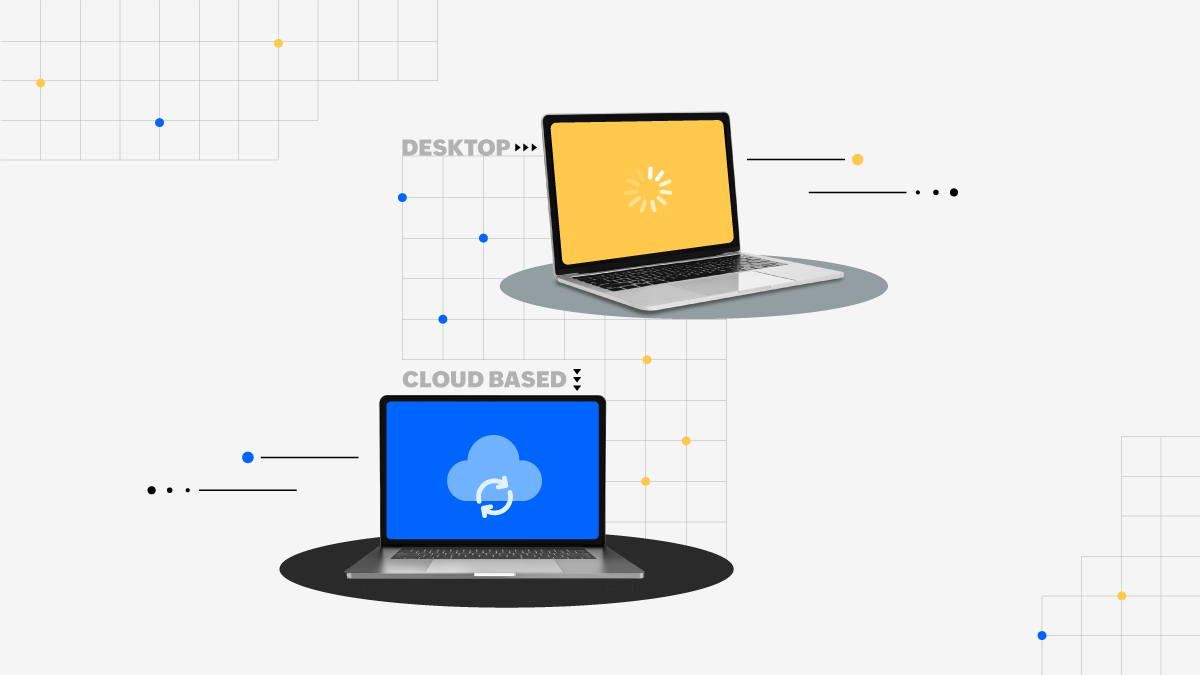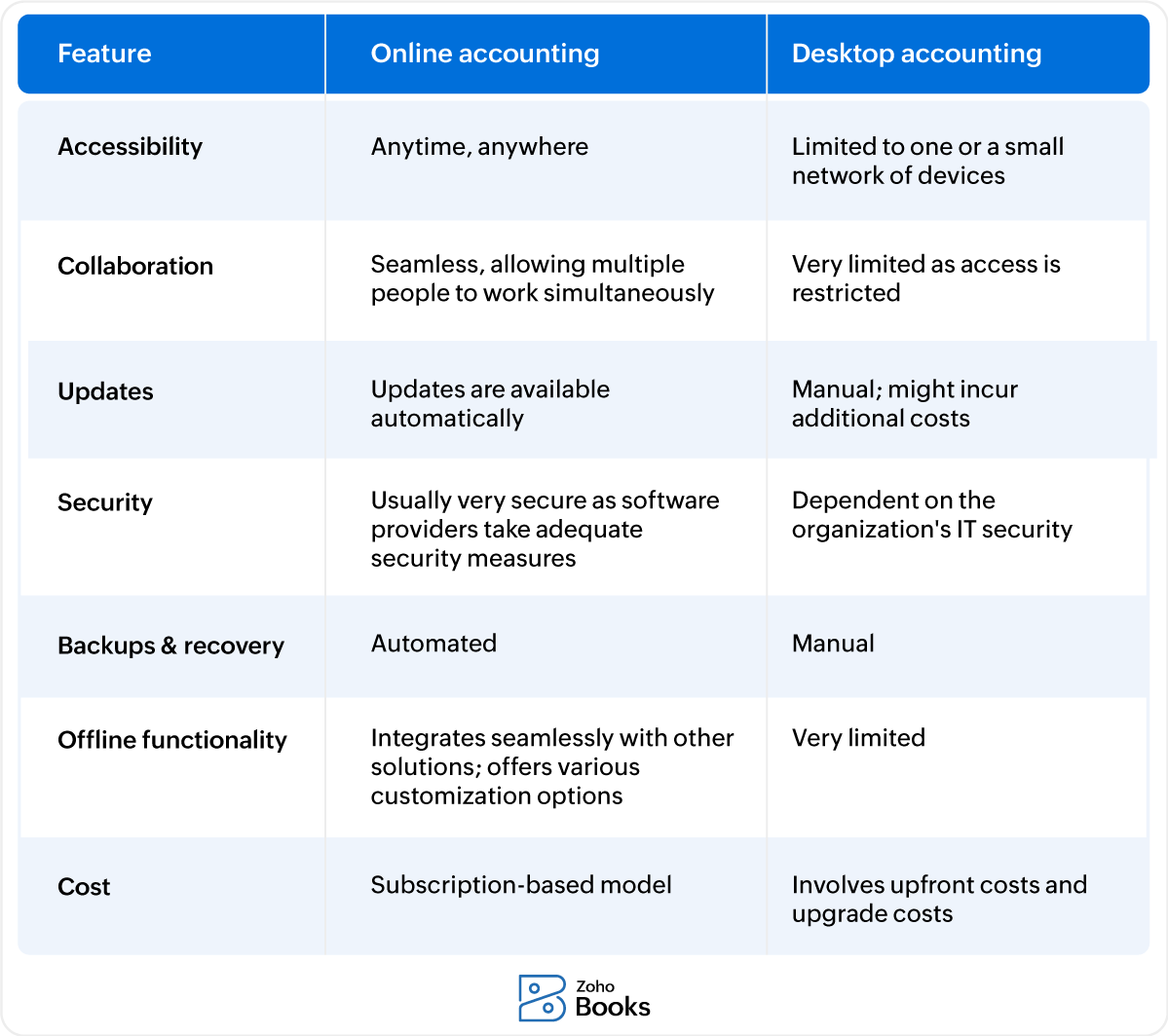- HOME
- Financial Management
- Online Accounting vs Desktop Accounting: Which is best for your business?
Online Accounting vs Desktop Accounting: Which is best for your business?

The tech tools that a company uses chart its future by influencing efficiency, stability, and growth. One vital tool is accounting software.
With various options available, one common debate that is still prominent is: online accounting vs desktop accounting. Which is best for your business?
What is online accounting software?
Online accounting software, more commonly known as cloud accounting software, is a type of accounting software that is accessed through the internet. Your financial data is stored securely in the cloud, allowing you to access it from anywhere with a stable internet connection. Just like how you can check your emails and social platforms through the internet, an online accounting software allows you to access your financial data from anywhere.
What is desktop accounting software?
Desktop accounting software is a software application that is installed on your computer to manage your accounting activities. Unlike cloud accounting software, here your data resides only on the computer and can be accessed only on that. Similarly, desktop accounting solutions don't need an active internet connection to function.
What are the advantages of online accounting software?
Accessible from anywhere with an internet connection.
Easy to implement; low/no upfront cost as there is no need to purchase any supporting infrastructure.
Data flows in real time, improving collaboration with team members.
Most online accounting software providers offer flexible plans that businesses can choose from based on their needs.
New features are automatically reflected based on the purchased plan, eliminating the need for manual updates.
Many online accounting solutions are designed to integrate seamlessly with other tech solutions like CRM systems, payroll, payment gateways, and more. This streamlines financial operations and also eliminates manual data entry.
Disadvantages of online accounting software
As they need a stable internet connection, they may not work smoothly in remote locations where connectivity is poor.
Long-term costs might be higher as online accounting solution providers follow subscription-based pricing.
As your data is hosted online, there is a risk of cyberattack with online accounting solutions that lack adequate security features.
What are the advantages of desktop accounting software?
As data is stored on your local device, the performance speed might be better.
As desktop software doesn't need an internet connection to function, the risk of security breaches is lower.
Disadvantages of desktop accounting software
Access is very limited as the software is installed only on a computer/intranetwork of computers, hindering easy collaboration.
Desktop accounting software may come with high upfront costs and also supporting infrastructure costs.
New features and updates need to be manually installed, which causes unnecessary delays.
Risk of losing data is very high as backups need to be made manually.
Customizations and integrations are limited as the software works on standalone systems.

How to decide which one is best for your business?
Both online and desktop accounting software have their own pros and cons. The decision to choose one over the other largely depends on your business needs. Here are some questions you can ask yourself to help you zero in on the right choice for your business.
Internet connectivity: How reliable is your internet connection? Does it disconnect often and take days to get fixed?
Number of users: Is your financial management handled by a single person or a team? If it's a team, do they work out of a single office?
IT infrastructure: Is your organization's IT security strong? Have you taken the necessary steps and made tech investments to strengthen your security?
Integrations: Do you want your accounting solution to seamlessly integrate with your CRM, payroll, project management software, or other platform?
Budget considerations: Can you afford upfront and additional infra costs now? Or would you like a subscription-based solution that doesn't pinch your pockets?
Need for migration: How easy is it to get your existing data into the new solution? If you need to switch over later, will it be easy to migrate?
There is no one-size-fits-all answer, and the decision to go with online or desktop accounting depends on your business requirements. If you are a fast growing business with remote teams and need integrations with other solutions, online accounting will be the right choice. But if you are operating out of a low-connectivity area or want your data to reside within your company, desktop accounting might still be relevant for you.
Over the years, we have witnessed a huge increase in cloud adoption by businesses. According to Gartner, cloud computing will shift from being a technology disruptor to a business necessity in the coming years.
If you are looking for a robust online accounting software for your business, Zoho Books is a good option you can explore. At Zoho Books, we understand each business is different, and our cloud accounting software offers all the features you need to manage your finances effectively, securely, and affordably.
Kickstart your journey towards simplified accounting by exploring our product for free!